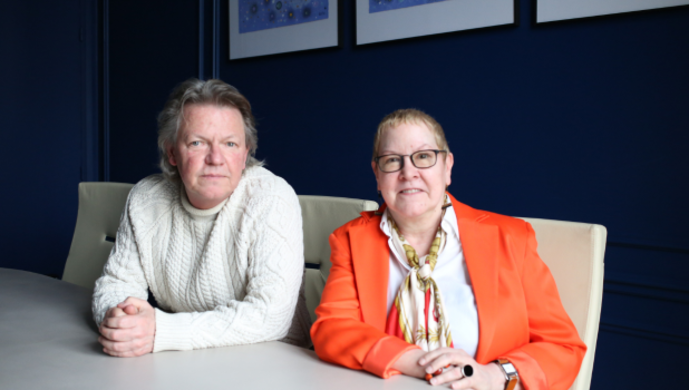Kristine, let’s start with the week of riots and violence that we saw in several UK cities in August. There was a popular outcry over the online impact on the aggressors—Internet sites that propagated fake news, inciting people to take to the streets. What parallel do you see between that situation and the research that you've done over the last decade on this platform you call HaHo (a pseudonym used to protect the anonymity of the founders)?
I think there are many, many ways in which what is happening offline and in real life is linked to what is happening online these days. Those are not two parallel words. They're completely integrated. However, online, it is easier to be aggressive. What we wanted to do in our research was to understand in an online context, how does this brutalization develop? What happened this summer in the UK is a good example, but we have many other examples. If we just think about our own experiences in schools where pupils bully each other during recreation breaks all the time. But it also happens online. These two worlds are very much interlinked, intertwined.
I was extremely shocked by what I saw happen in the UK after the Southport stabbings. As a researcher, you want to understand what are the conditions that have led to this. And if you understand the conditions, perhaps, then there is something you can do with policies, with ethics. I heard on the news recently that in Australia they're thinking about forbidding the use of social media for 16 years and under. We’re starting to see these measures being debated in several countries in reaction to these kinds of outbursts of extreme violence. This violence shouldn’t be exclusively linked to social media, however. There is tension in many domains and many dimensions.
Kristine, let’s turn to your research paper, published by the Journal of Consumer Research. You and your fellow researchers had privileged access to a huge amount of data—over 7 million posts and 170 discussion threads on this online platform devoted to the UK’s electronic dance music scene—dating back to 2001. That’s when a certain “John,” a pseudonym, decided to bring together a group of friends to exchange tips on music. But it soon mushroomed into the biggest platform in this genre. And that’s when John just lost control of its contents. How did it mushroom in this way?
You can say there were multiple things happening. The first thing was this community of electronic dance lovers would meet to go clubbing over the weekend. And then, in a sense, they were waiting for the rest of the week until the following Friday and Saturday to go out. In the meantime, they connected in this online community with the purpose of exchanging tips about music, deejays, concerts, and stuff like this. But there was a limit to what they could discuss. So, this community started to talk about personal things.
What kind of people were they when they were not enjoying this electronic dance music scene?
These were people like you and me, people that go to work, that are married, that raise kids, that were students. Once they entered the online communities, well, there were no barriers, no generational, geographical, or financial barriers. So, it brought together a heterogeneous group of people. They shared this common desire for entertainment, escapism, joy, and thrills, one way or the other. Only these community members started to create excitement themselves, and they did that in a violent way by creating games and insulting other members. It would go in crescendo, members looking to outdo the others by saying something really bad about you. Then you would have to say something really, really bad about the person after you. And so, there was this name-calling, and that went from bad to worse.
This community became a thrill-seeking escapist community, looking to feel excited and entertained. On top of that, there was this belief that what happens in this community online is not real, and people who would feel offended were overreacting. But the consequences in real life were quite serious.
Absolutely. Many members dropped out. But we also observed that many were simply stuck in that system of online communities. They had invested time and energy, created friendships, and thus could not just step out of the community without losing social and emotional capital. So, many would come back even after being badly aggressed verbally.
Kristine, you’ve been a marketing specialist for over 25 years. What is the link between marketing and this research?
As marketing researchers, one of the most important things that we try to understand is consumers' motivation and behavior. Many of my colleagues will do that in a psychological, experimental way, I'm part of a group of people that has a cultural, sociological approach. In this paper, we sought to understand consumer culture and consumer behavior that we see online and that could have public policy consequences.
In this paper, we sought to understand consumer culture and consumer behavior that we see online and that could have public policy consequences.
This community was consumer-generated and consumer-owned. But how do they ensure that there's no brutalization happening? Our research tries to find answers to that.
In this research paper, you found three forms of violence: sadistic entertainment, clan warfare, and popular justice. Could you elaborate a bit more on these three categories?
We call them brutalization constellations. In each of these three constellations, there was a combination of direct violence, structural violence, and cultural violence. I can explain it with clan warfare. This community started with a group of friends, but quite rapidly people from all over the UK joined this online community to chip in about electronic dance music. Many came from a different social class background, with different types of professions and different tastes in music and dress. They had different norms about what was good behavior when you would go clubbing. Tensions started to appear between those different groups, and they became aggressive and violent with words. We call this the brutalization constellation, which led to a form of clan warfare.
This combined with structural violence, which means that some people on the platform had more power. For example, there were moderators in this community with the discretionary power to evict people, or to pronounce that this one is right and that one is wrong. That’s what we call clan tyranny, where some clans had structurally more power over other clans. And as a result, some clans were marginalized or pushed out by other clans. At the same time, there was a discourse among the original clans that if they didn’t react, their community would be taken over by the wrong people with the wrong taste and the wrong behaviors. They felt subject to cultural degradation and reacted with violent online behavior, such as photoshopping pictures of another clan member drowned in his or her own blood; it was violent, extremely violent. But they told each other, “We can do this because we're doing it to protect our community.”
You mentioned moderators. There was an attempt by this website to moderate and try and get rid of this violence. It didn't seem to work, and that's what brought in popular justice. So, can you tell us more about that?
Yes, so that is indeed the third brutalization constellation that we observed. At the beginning, we have this group of friends. And they did moderation. It was in their interest to maintain this space as a nice place. So, the moderators did try to evict the most aggressive people. But, as you can imagine, no one was paid to do this kind of job. It was all volunteer based and, over time, the founders took a bit of a back seat. They had other things to do; in those 18 years, they had become older, had a family, whatever. They had other responsibilities and spent less time in this community. And when you have social systems where there is no governance anymore, people take over and mete out justice themselves. And this is what we saw in this community. It sometimes became a bit surrealistic, for example, they would say you cannot post in pink colors. And they would then harass and brutalize these other members to force them out of this community.
However, there was a change, and now, in 2024, this platform, has become a lot more, shall we say, family-friendly. There's none of that brutalization that you saw at its peak. How did that occur?
There were a few factors. The moderators ended up expelling and evicting from the community the biggest perpetrators. And they structurally rewarded the opposite behavior. At the beginning of the community, they would reward aggressive behavior that would cause a meltdown. They had all sorts of rewards, pushing people towards aggressive, violent behavior. Then, at one point in time, they started to reward members for the opposite behavior. They called it the Redeemed Member award for someone who has embraced a culture of care and being friendly to each other. They would say “We're just a group of clubbers that want to have a good time online and offline.” And it seems to have worked.
References heard in the podcast:
John Galtung, the father of peace studies;
Daft Punk;
Advertising by Sephora: "We Belong to Something Beautiful";
"What We Started - History Of Electronic Dance Music", the full documentary movie;
"Online abuse 'the same as face-to-face'": BBC News Review.









